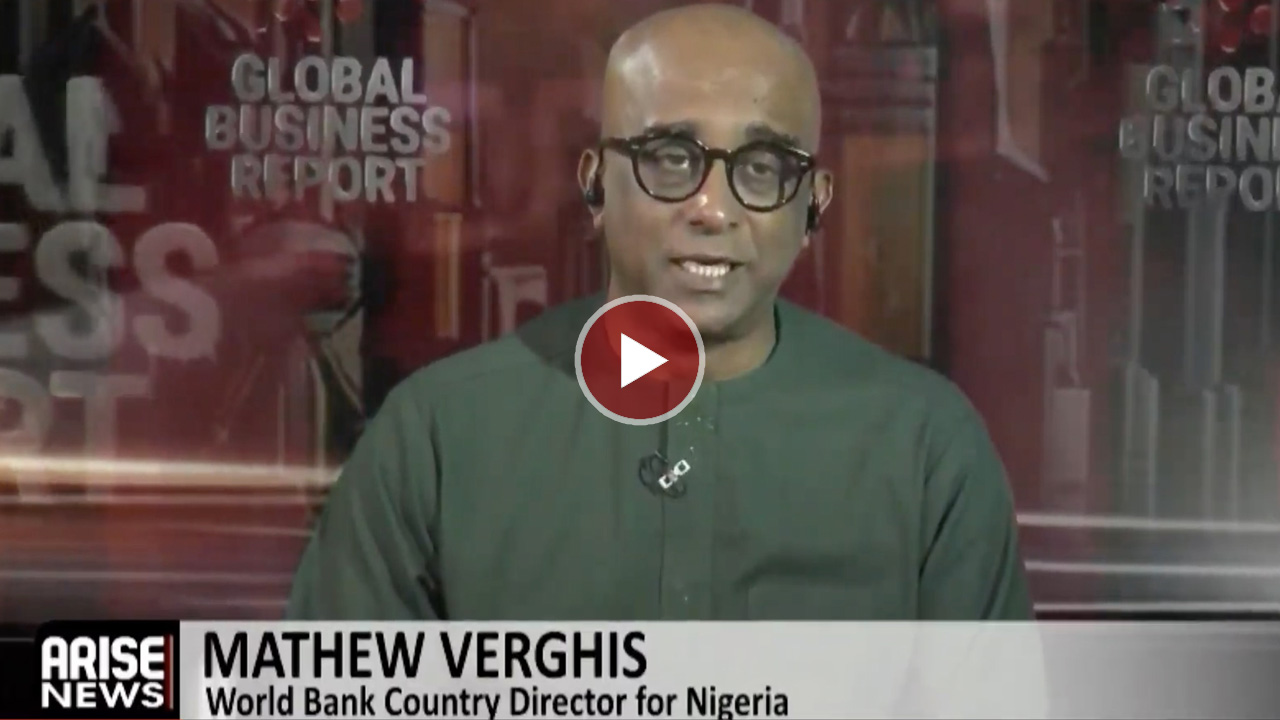
The World Bank Country Director for Nigeria, Mathew Verghis, says reducing inflation remains the most critical step for stabilising the economy, restoring purchasing power and reversing rising poverty.
In an interview on ARISE News on Thursday, Verghis warned that “the most immediate thing that can be done to reduce poverty is for the rate of inflation to fall,” stressing that high food inflation continues to erode incomes, especially among the poor.
He explained: “The reason we are projecting poverty to continue to rise in 2025, and possibly into 2026, is because inflation remains high enough that it’s undermining household incomes, especially for the poor, because food inflation remains at around 20%.”
Verghis said monetary and fiscal authorities must remain cautious in loosening policy, as inflation is still “one of the highest in the world.” He noted: “Bringing inflation down should be a very high priority. There’s still a long way to go, and that’s arguably the most urgent task of the stabilisation process.”
On long-term structural drivers of inflation, he highlighted high transport costs caused by poor infrastructure and multiple checkpoints, inadequate energy supply and lack of irrigation. He added that the World Bank is supporting government efforts to address these constraints.
However, he said some measures could yield quicker results. “Nigeria has high tariffs and, in some cases, import bans on goods consumed by the poor… One way of lowering inflation quickly is to reduce some of these tariffs and take away some of these import bans,”he said, noting their consistency with ECOWAS commitments.
Turning to economic reforms, Verghis stressed that stabilisation requires sustained effort. “When you’re undertaking a reform programme and a stabilisation process like this, it’s very important that policies continue to evolve. It can’t be just a one-off change,”he said, adding that India and China provide examples of decades-long reform.
He supported the Central Bank’s decision to keep the benchmark rate unchanged at 27%, saying: “Monetary policy has to play a very careful role in making sure they don’t loosen too early.”
On exchange rate management, Verghis said the priority should be maintaining alignment with market fundamentals. “The best way to keep the Naira stable is to make sure that your exports are increasing and your foreign direct investment is increasing,” he said.
He added that stability is not the end goal: “The primary objective is to get growth going, and a stable exchange rate that allows businesses to plan will contribute to that.”
Verghis also praised progress in revenue diversification. “Nigeria is now, today, much less dependent on oil revenues than it was before,”he said, attributing this to a more realistic exchange rate and the removal of petrol subsidies. He argued that higher non-oil revenues will allow greater investment in infrastructure and human capital.
On Nigeria’s borrowing, he said the outlook is improving. “The debt-to-GDP ratio is now at levels we consider reasonably moderate,”he said. With rising revenues, “the debt-to-revenue ratio is now actually falling for the first time in a long time.”
Still, he cautioned that how borrowed funds are used remains crucial: “If you keep borrowing… and the money gets wasted, then eventually you’ll have a debt problem. The key is that the debt is borrowed and spent wisely.”
On inclusive growth, Verghis said public spending must be consciously targeted at the poor. He highlighted the federal government’s cash transfer programme, saying: “The president announced a goal of reaching 15 million poor households… using a digital social registry and digital transfers to improve the targeting.”
He said investments in children, clean water, nutrition, schooling and health are essential for long-term productivity. “Targeting these pro-poor investments can have a big impact on inclusive growth,” he said.
Verghis concluded that Nigeria must combine short-term inflation-fighting measures with long-term reforms: “It’s a combination of immediate measures to bring inflation down and structural measures to encourage investment so that the economy grows at a faster rate than it is now.”
Boluwatife Enome



